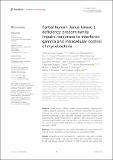Files in this item
Partial human Janus kinase 1 deficiency predominantly impairs responses to interferon gamma and intracellular control of mycobacteria
Item metadata
| dc.contributor.author | Daza-Cajigal, Vanessa | |
| dc.contributor.author | Albuquerque, Adriana S. | |
| dc.contributor.author | Young, Dan F. | |
| dc.contributor.author | Ciancanelli, Michael J. | |
| dc.contributor.author | Moulding, Dale | |
| dc.contributor.author | Angulo, Ivan | |
| dc.contributor.author | Jeanne-Julien, Valentine | |
| dc.contributor.author | Rosain, Jérémie | |
| dc.contributor.author | Minskaia, Ekaterina | |
| dc.contributor.author | Casanova, Jean-Laurent | |
| dc.contributor.author | Boisson-Dupuis, Stéphanie | |
| dc.contributor.author | Bustamante, Jacinta | |
| dc.contributor.author | Randall, Richard E. | |
| dc.contributor.author | McHugh, Timothy D. | |
| dc.contributor.author | Thrasher, Adrian J. | |
| dc.contributor.author | Burns, Siobhan O. | |
| dc.date.accessioned | 2022-09-30T14:30:06Z | |
| dc.date.available | 2022-09-30T14:30:06Z | |
| dc.date.issued | 2022-09-09 | |
| dc.identifier | 281539178 | |
| dc.identifier | 2b70c101-4faf-42e6-a447-e0c9d2f7c89d | |
| dc.identifier | 000860012300001 | |
| dc.identifier | 85138643455 | |
| dc.identifier.citation | Daza-Cajigal , V , Albuquerque , A S , Young , D F , Ciancanelli , M J , Moulding , D , Angulo , I , Jeanne-Julien , V , Rosain , J , Minskaia , E , Casanova , J-L , Boisson-Dupuis , S , Bustamante , J , Randall , R E , McHugh , T D , Thrasher , A J & Burns , S O 2022 , ' Partial human Janus kinase 1 deficiency predominantly impairs responses to interferon gamma and intracellular control of mycobacteria ' , Frontiers in Immunology , vol. 13 , 888427 . https://doi.org/10.3389/fimmu.2022.888427 | en |
| dc.identifier.issn | 1664-3224 | |
| dc.identifier.other | Jisc: 619367 | |
| dc.identifier.other | ORCID: /0000-0002-9304-6678/work/120051600 | |
| dc.identifier.uri | https://hdl.handle.net/10023/26112 | |
| dc.description | Funding: This work was supported by the Alfonso Martin Escudero Foundation (VD-C), Rosetrees Trust Foundation (VD-C, SB), and the Wellcome Trust (104807/Z/14/Z and 101788/Z/13/Z) (AT, RR, and DY). The project was sponsored by University College London (UCL) and the National Institute for Health Research Biomedical Research Centre at Great Ormond Street Hospital for Children NHS Foundation Trust. AA and EM were supported by the National Institute for Health Research UCLH Biomedical Research Centre. The Laboratory of Human Genetics of Infectious Diseases is supported in part by institutional grants from INSERM, Paris Cité University, Foundation for Medical Research (FRM) (EQU201903007798), St. Giles Foundation, The Rockefeller University Center for Clinical and Translational Science (8UL1TR001866), the National Center for Research Resources, the National Center for Advancing Sciences (NCATS), National Institutes of Health, the National Institute of Allergy and Infectious Diseases (5R01AI089970, 5R37AI095983 and U19AI111143) and grants from the French National Research Agency (ANR) under the “Investments for the future” program (ANR-10-IAHU-01) and GENMSMD (ANR-16-CE17-0005-01 for JB) grants. VJ-J was supported by LABEX IBEID. JR is supported by INSERM (“poste d’accueil”) and the MD-PhD program of the Imagine Institute with the support of the Bettancourt-Schueller Foundation. | en |
| dc.description.abstract | Purpose: Janus kinase-1 (JAK1) tyrosine kinase mediates signaling from multiple cytokine receptors, including interferon alpha/beta and gamma (IFN-α/β and IFN-γ), which are important for viral and mycobacterial protection respectively. We previously reported autosomal recessive (AR) hypomorphic JAK1 mutations in a patient with recurrent atypical mycobacterial infections and relatively minor viral infections. This study tests the impact of partial JAK1 deficiency on cellular responses to IFNs and pathogen control. Methods: We investigated the role of partial JAK1 deficiency using patient cells and cell models generated with lentiviral vectors expressing shRNA. Results: Partial JAK1 deficiency impairs IFN-γ-dependent responses in multiple cell types including THP-1 macrophages, Epstein-Barr Virus (EBV)-transformed B cells and primary dermal fibroblasts. In THP-1 myeloid cells, partial JAK1 deficiency reduced phagosome acidification and apoptosis and resulted in defective control of mycobacterial infection with enhanced intracellular survival. Although both EBV-B cells and primary dermal fibroblasts with partial JAK1 deficiency demonstrate reduced IFN-α responses, control of viral infection was impaired only in patient EBV-B cells and surprisingly intact in patient primary dermal fibroblasts. Conclusion: Our data suggests that partial JAK1 deficiency predominantly affects susceptibility to mycobacterial infection through impact on the IFN-γ responsive pathway in myeloid cells. Susceptibility to viral infections as a result of reduced IFN-α responses is variable depending on cell type. Description of additional patients with inherited JAK1 deficiency will further clarify the spectrum of bacterial and viral susceptibility in this condition. Our results have broader relevance for anticipating infectious complications from the increasing use of selective JAK1 inhibitors. | |
| dc.format.extent | 14 | |
| dc.format.extent | 11106018 | |
| dc.language.iso | eng | |
| dc.relation.ispartof | Frontiers in Immunology | en |
| dc.subject | Immunology | en |
| dc.subject | JAK1 | en |
| dc.subject | IFN immunity | en |
| dc.subject | Immunodeficiency | en |
| dc.subject | Mycobacterial disease | en |
| dc.subject | Viral susceptibility | en |
| dc.subject | QR180 Immunology | en |
| dc.subject | NDAS | en |
| dc.subject | NIS | en |
| dc.subject | MCC | en |
| dc.subject.lcc | QR180 | en |
| dc.title | Partial human Janus kinase 1 deficiency predominantly impairs responses to interferon gamma and intracellular control of mycobacteria | en |
| dc.type | Journal article | en |
| dc.contributor.sponsor | The Wellcome Trust | en |
| dc.contributor.institution | University of St Andrews. School of Biology | en |
| dc.contributor.institution | University of St Andrews. Biomedical Sciences Research Complex | en |
| dc.identifier.doi | https://doi.org/10.3389/fimmu.2022.888427 | |
| dc.description.status | Peer reviewed | en |
| dc.identifier.url | https://www.frontiersin.org/articles/10.3389/fimmu.2022.888427/full#supplementary-material | en |
| dc.identifier.grantnumber | 101788/Z/13/Z | en |
This item appears in the following Collection(s)
Items in the St Andrews Research Repository are protected by copyright, with all rights reserved, unless otherwise indicated.

